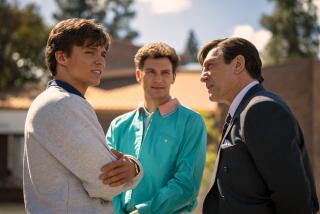A Collection With Much Missing
Velina Hasu Houston makes no bones about where she is coming from. “To be marginalized in the United States . . . is to have much of one’s experience inadvertently or conveniently omitted from the nation’s ‘history,’ ” she writes in her introduction to the just-published “But Still, Like Air, I’ll Rise: New Asian American Plays,” which she has edited. “Written from the heterosexual, patriarchal, Eurocentric perspective,” she continues, “this incomplete history presents itself as unchallengeable, immortal, and righteous; any examination of it meets with cries of indignation.”
At this late date in the culture wars, could any argument be more tired? Houston, an associate professor at USC and a playwright produced at major nonprofit theaters such as the Manhattan Theatre Club and the Old Globe, writes as if the past two decades never occurred--as if Maxine Hong Kingston and Amy Tan were not best-selling novelists, as if David Henry Hwang and Philip Kan Gotanda were not produced all over the country, and as if other writers like Gish Jen, David Wong Louie, Anchee Min, Jessica Hagedorn, Gus Lee, Cynthia Kadohata, Wakako Yamauchi and Wendy Law-Yone, among others, had not found critics and audiences eager to applaud their stories, none of which were met with cries of indignation.
Here in Los Angeles, we have the nation’s oldest Asian American theater company, East West Players, founded in 1965 (two of the plays in this volume, Chay Yew’s “A Language of Their Own” and Sung Rno’s “Cleveland Raining” were produced there). A Web site called the Asian American Theatre Revue lists 38 such theaters nationwide, including well-known places like New York’s Pan Asian Repertory, San Diego’s Asian American Repertory Theatre and San Francisco’s Asian American Theater Company. In the last two years, West Coast audiences could chose from a steady diet of good new plays, from Diana Son’s bright cartoon “Boy” at the La Jolla Playhouse, to Gotanda’s lyrical “Ballad of Yachiyo” at South Coast Repertory to the charming romantic comedy “S.A.M. I Am,” by first time playwright Garrett Omata, at East West to David Henry Hwang’s family history, “Golden Child,” again at South Coast Rep, which is scheduled to open on Broadway in February.
And while I would never posit that there are enough good plays from Asian Americans (or from anyone else for that matter), I would say that Houston overstates the cultural resistance to them.
Amid her lecturing, Houston does not leave room in the introduction to discuss the plays she has gathered here, except to say she wanted to represent as wide a spectrum as possible of plays by Americans of Asian descent. She keeps her comments exceptionally vague: “One thing I can say about [these plays] is that they are both individualistic and universal in their views of the human condition.” Perhaps Houston’s murkiness accounts for the inconsistency in this collection (Temple University Press: 543 pp., $64.95, cloth; $24.95, paper). But readers will find some work of value here.
Elizabeth Wong’s “Kimchee and Chitlins” gives us a complex heroine in a complex situation--despite the belabored title and ending, both of which cornily suggests a banquet of ethnic foods as the cure for racism. The play’s heroine, Suzie Seeto, is a Chinese American TV news reporter, covering a racial incident set off when a black woman may or may not have been assaulted in a Brooklyn store run by a Korean grocer. Wong throws a lot into the mix--including 21 characters and a subversive Greek chorus that sometimes contradicts and annoys the heroine--giving the play a breathless feel that suits the journalistic and moral questing of the heroine. This muscular play (produced at the West Coast Ensemble here in 1994) is a pleasure to read.
Victoria Nalani Kneubuhl’s “The Conversion of Ka’ahumanu” tells the story of two white women who travel to Hawaii in 1819 to convert the heathens. The clash of feminine cultures is vividly evoked, with equal weight given to both sides. Where the missionaries find the natives wanton and misguided, the Hawaiians find the white women oddly unsexual and wonder why they can’t relax. The themes of the play--that simple kindness can build bridges between communities, that the Christians win out not because they’re right, but because they are more powerful--organically emerges from the dramatic action.
Houston’s own play, “Kokoro (True Heart)” takes off when it breaks free of the playwright’s penchant for thick poetry. In this play Houston attempts to explain the concept of oyako shinju--parent-child suicide--by telling the story of Yasako, a Japanese woman brought to San Diego by a husband who then opens a successful restaurant and impregnates one of the waitresses there. The wounded Yasako believes her only road to honor is this desperate solution, and Houston delicately, empathetically paints Yasako’s reality. Other characters, however, are alive fleetingly or not at all. Yasako’s neighbor, for instance, demonstrates an instant and unshakable loyalty to Yasako, which helps the action along but isn’t credible.
Lucy Wang’s comedy “Junk Bonds” is an admirably ruthless expose of life on Wall Street, where a young woman must make her way in the aggressively sexist trading pits, amid ferociously shifting loyalties, and she does. The two best known names in the collection--Hwang (“Bondage”) and Gotanda (“Day Standing on Its Head”)--contribute works that are not their best but are worthwhile reads.
Some of the plays collected here are neither “universal” nor “individualistic” but are simply inept, or immature. “Dance of the Wandering Souls,” by Huynh Quang Nhuong, is so amateurish and stiff that it suggests nothing but a desperate search to include a Vietnamese American play in the collection. In this tale of a mythical Vietnamese Queen’s battle to fight the Chinese, the dialogue sounds like it was written for wax figurines. In a typical passage, the Queen exclaims, after a battlefield victory, “What a joyful day! Now I can let most of our warriors go home. I hope the Chinese will leave us alone from now on.”
“Breaking Glass,” by Dmae Roberts, is a competent, but generic family drama, in which the struggles of the family members are stated in Cliffs Notes simplicity. Within the first few minutes of the play, the mother says, “Family should work together. No Chinese restaurant in Junction City. We could make lots of money,” and her Amerasian daughter responds, “That’s your dream, not mine.” The mother and daughter struggle over the soul of the passive son, and when at the end he collapses from too much infighting, so does the play.
“Talk-Story” by Jeannie Barroga is also a thin work, in which Dee, a Filipina American heroine, is a copy girl striving to be a newspaper columnist in order to tell stories that no one else is telling. Her best pal, a black woman named Clara, has almost no personality whatsoever. Dee however has at least two personality traits--she idolizes Rosalind Russell in “His Girl Friday” and she has integrity. She delivers an anguished lecture to a co-worker who has referred to Kurosawa as a “Jap director.” “Why can’t I be treated like a person!,” she says, imitating her idol, even though it is impossible to imagine Russell making this Shylock-on-”Saturday Night Live” speech. “Why am I being treated like this? I take up space, I have skin, blood that will bleed, and tears that will fall! I HAVE FEELINGS, damnit!”
Sometimes there is reason to include inferior works in collections of plays. “Black Theatre USA,” which was published last year by Free Press, included several nearly forgotten plays from the 19th century that were powerful historical documents, full of information about accepted attitudes of the day, even if they were not exactly producable today.
But in a collection of new and recent plays, one hopes to find work that is moving, entertaining, absorbing. And some of the 11 plays that Houston has collected here are those things. But this is an uneven read. In her introduction, Houston says that she encountered some availability constraints since several other Asian American anthologies are now in the making (at least three already exist, one of them also edited by Houston). “But Still, Like Air” could have benefited from a stronger raison d’e^tre, particularly if the field is about to become more crowded.
More to Read
The biggest entertainment stories
Get our big stories about Hollywood, film, television, music, arts, culture and more right in your inbox as soon as they publish.
You may occasionally receive promotional content from the Los Angeles Times.










